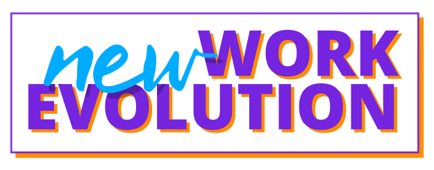Welcome to the NEW WORK EVOLUTION
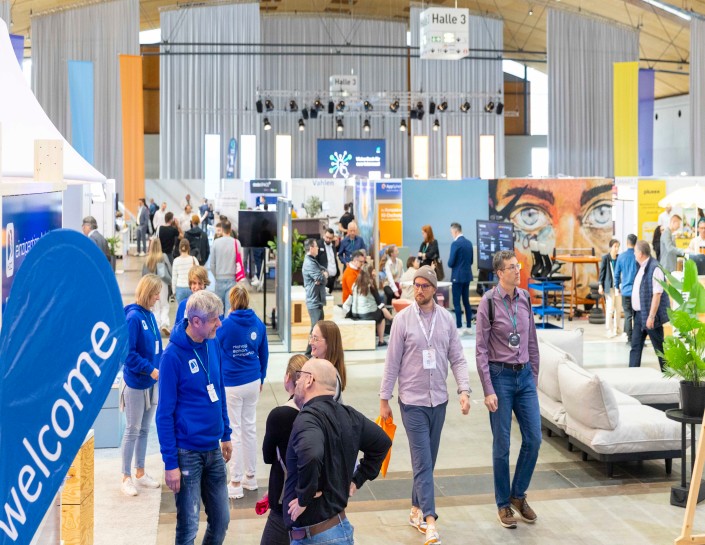
Experience live how New Work is lived and find out about products and services for innovative working environments and modern corporate culture.
In addition to exhibition areas, you can expect inspiring speakers, real best practices, workshops and plenty of opportunities to network and exchange ideas.
Experience how work is being rethought - and discover #nwe26!
Experience the future of work live - at NEW WORK EVOLUTION 2026
Since its successful launch in 2023, NEW WORK EVOLUTION has grown year on year - 2024 brought new impetus, while 2025 was even bigger, more creative and more interactive. The Main Stage and the exhibitors' presentation areas not only showcased exciting insights, but also gave visitors the opportunity to get active themselves - in interactive workshops related to the four Focus Areas:
The Technology themed area shows how AI and digital tools are changing work. In Offices, you can find out how modern interior design promotes collaboration. DE&I (diversity, equity and inclusion) celebrated diversity as a strength - New Work for all. And in People & Culture, the focus is on people's well-being.
NEW WORK EVOLUTION is a place where decision-makers from companies, HR professionals, IT and facility managers, architects and New Work pioneers come together. Here you will meet innovative brands, inspiring minds, strong networks - and find new ideas for the world of work that you want to (co-)shape.
In 2026, NEW WORK EVOLUTION will enter its 4th round from 5 to 7 May. Join us and shape the working world of tomorrow!
Translated with DeepL.com (free version)
Fit for the #nwe26 - with our digital event platform (talque)
With our digital event platform, you are optimally prepared for #nwe26- you can discover the programme, all exhibitors and their products in advance, put together your personal agenda in the app and plan targeted meetings on site. All you need is a valid ticket - then you can register.
Opening hours 2025
| Date | Opening hours | Event venue |
|---|---|---|
| Tuesday, 05 May 2026 | 9 a.m. to 6 p.m. | Messe Karlsruhe Messeallee 1 76287 Rheinstetten |
| Wednesday, 06 May 2026 | 9 a.m. to 6.p.m. | Messe Karlsruhe Messeallee 1 76287 Rheinstetten |
| Thursday, 07 May 2026 | 9 a.m. to 5 p.m. | Messe Karlsruhe Messeallee 1 76287 Rheinstetten |
Prices 2025
| Tickets | |
|---|---|
| Reduced day ticket** | 25 € |
| Day ticket | 59 € |
| Reduced season ticket | 59 € |
| Season ticket | 99 € |
| **Reduced tickets for schoolchildren, students, trainees, people doing community service, jobseekers, pensioners or people with disabilities, employees of public and private universities and colleges and the German armed forces. Verification checks at admission. | |
| All prices incl. 19% VAT. | |
Parking tickets
| Parking tickets | Buy your parking ticket at the same time as your ticket. Book the desired number of parking tickets for the day of your visit easily and contactlessly online. The booking is made in the respective ticket shop. 9 € / day (On site at the box office 10€) |
Our services for your trade fair visit
We also offer you full service on site. Here you can find out more about our electronic visitor information system and what information our information desk has for you. In addition, you can find out more about the possibilities of using the internet at our exhibition centre.
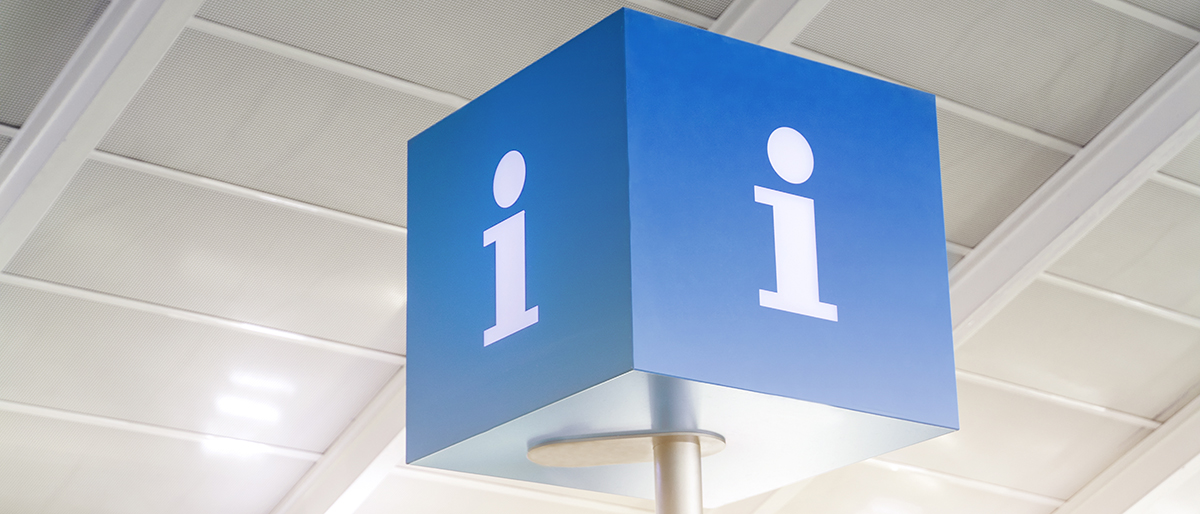
At the info point in the action hall you will find information on restaurants and hotels in the area as well as a preview of upcoming trade fairs. At the info counters in front of the halls, they will be happy to help you personally with any questions you may have about the current event.

There is a "toilet for all" on the exhibition grounds that is specially designed for use by people with multiple disabilities. It is also equipped with a lift and an emergency call system. This toilet is open during the respective opening hours of the event on the exhibition grounds.
Wheelchairs:
- Free service for your visit to the fair. Please contact the colleagues of the DRK on site on the respective day of your visit by calling 0721 3720 5230.
- A wheelchair (without electric drive) will be brought to you for the duration of your visit to the fair (subject to availability).

Free WLAN access
During the fair, as a registered user, wireless internet access is available free of charge in the hall area of our exhibition grounds.
Free W-LAN on the exhibition grounds
You will need your own WLAN-enabled terminal with a web browser function.
Please note the following information:
- To use the W-LAN, you need a WLAN-capable end device with the worldwide common WLAN standard IEEE 802.11 n/ac.
- Area-wide reception may not be guaranteed if there are a large number of users.
- The maximum bandwidth is 8 Mbit/s per end device. Depending on the hall load, the bandwidth may be lower.
- A user/end device can go online for a maximum of 4 hours with a mobile end device.
- Premium Wi-Fi
If you need a higher bandwidth, we advise you to order our Premium Wi-Fi for the highest online demands (without bandwidth limitation) for a fee (buy online or in the Business Center Entrance West).
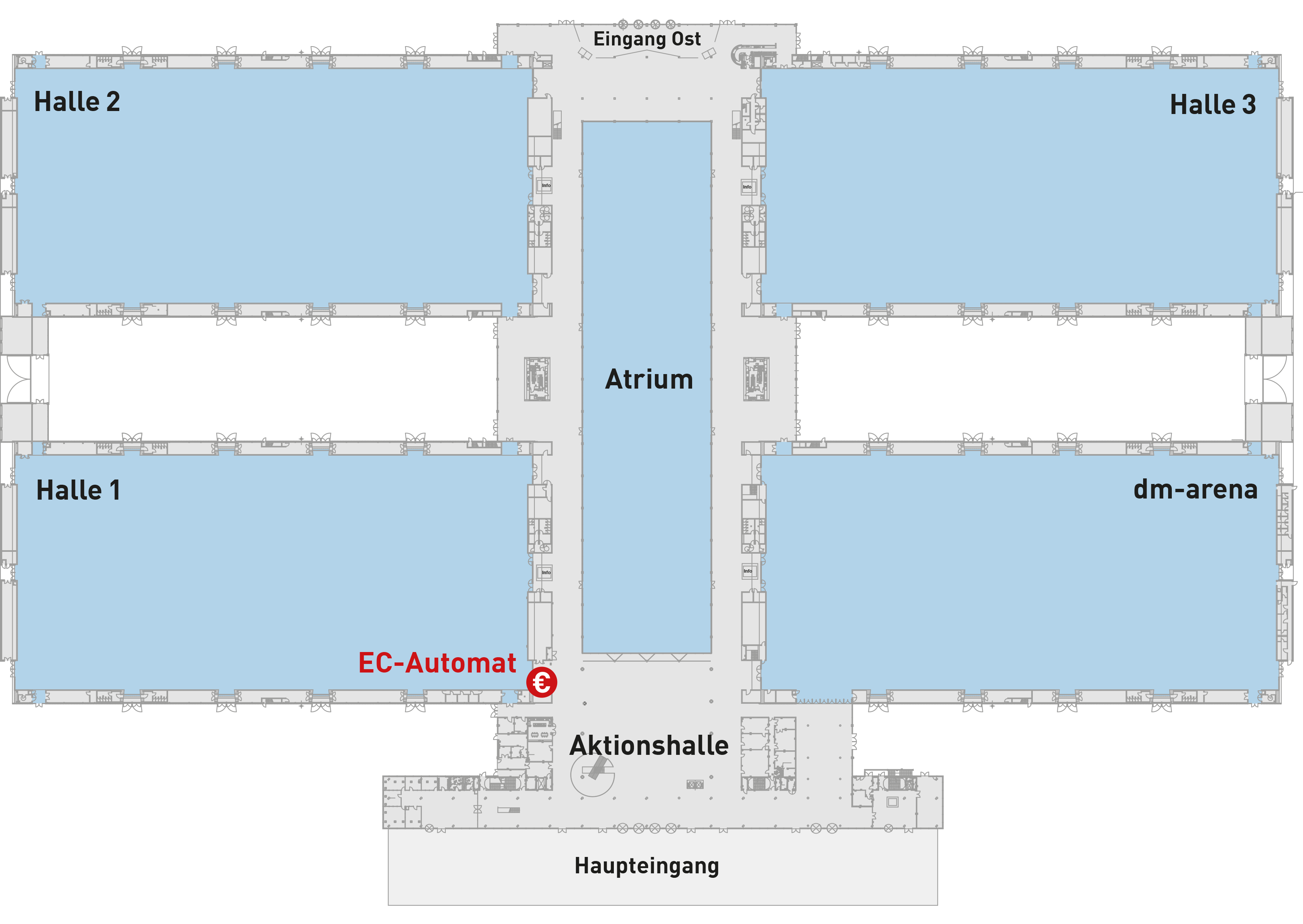
Messe Karlsruhe provides its visitors with an EC cash machine directly on the exhibition grounds. This is located in the action hall near the main entrance.
Cash withdrawals from these machines are free of charge for Volksbank customers. This also applies to savings bank customers of the city of Karlsruhe-Ettlingen, but not to savings bank customers outside this district and other banks.

On the exhibition grounds, a fee of 2 euros is charged for the use of the cloakroom service for items of clothing and 3 euros for items of luggage. Lockers are available in the basement using a 1 euro deposit coin.
You will find digital lockers in the entrance area (main entrance) on the left-hand side.
12 out of 24 LiveLockers are equipped with the option of charging batteries from mobile devices. After opening the LiveLocker, you will find
- a 220V/16A socket to connect your own power supply units, e.g. for charging laptops or bicycle batteries and
- a USB type A and a USB type C socket with a combined output power of 18W.
You can book these in advance for your stay at live-locker.com
There is a charge of 5 euros per day for use.
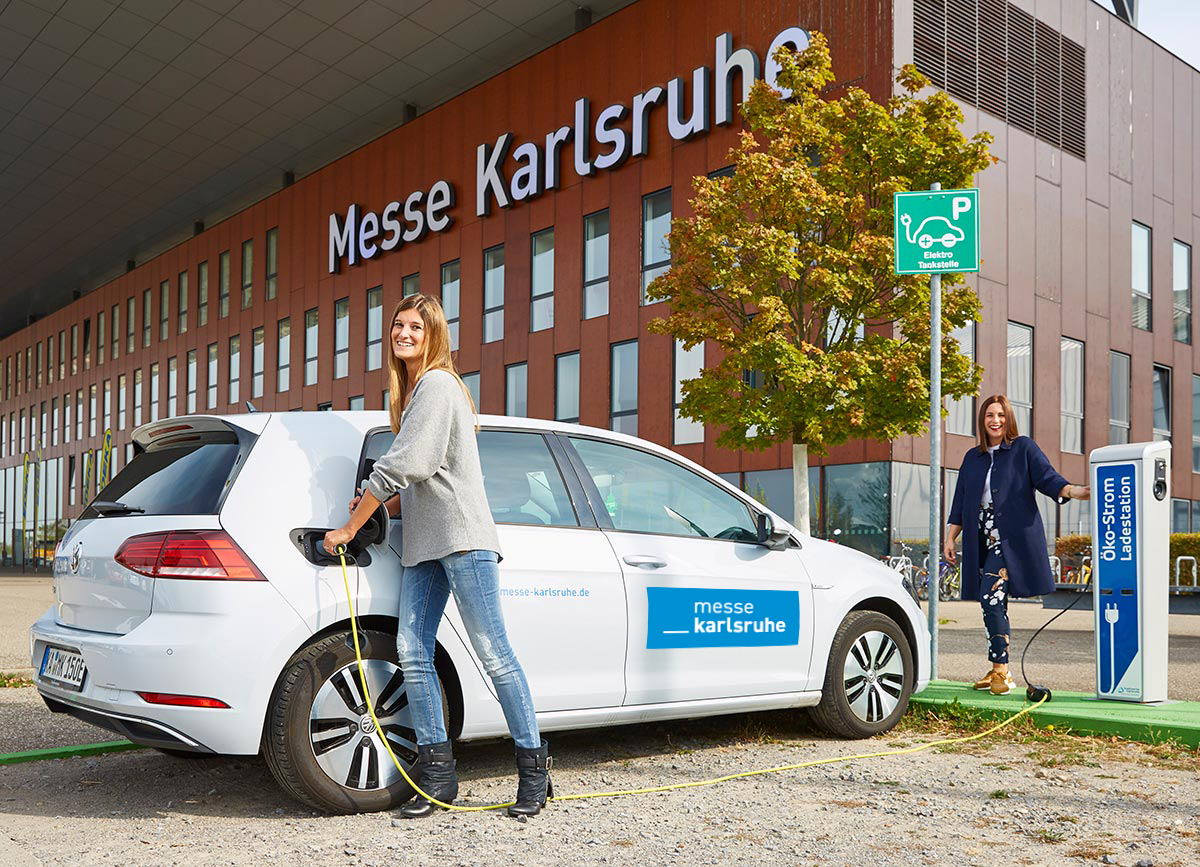
Visitors to Karlsruhe Trade Fair Centre can use the charging stations for electric vehicles in car park P1, one charge costs 6 euros. A type 2 plug is required. Please note: Vehicular entrance to P1 is subject to a fee. The charging stations cannot be reserved.
Die Messe Karlsruhe gestattet keine Tiere auf dem Messegelände.
Ausnahmen sind Führhunde für Menschen mit Behinderungen, Blindenhunde und Diensthunde.
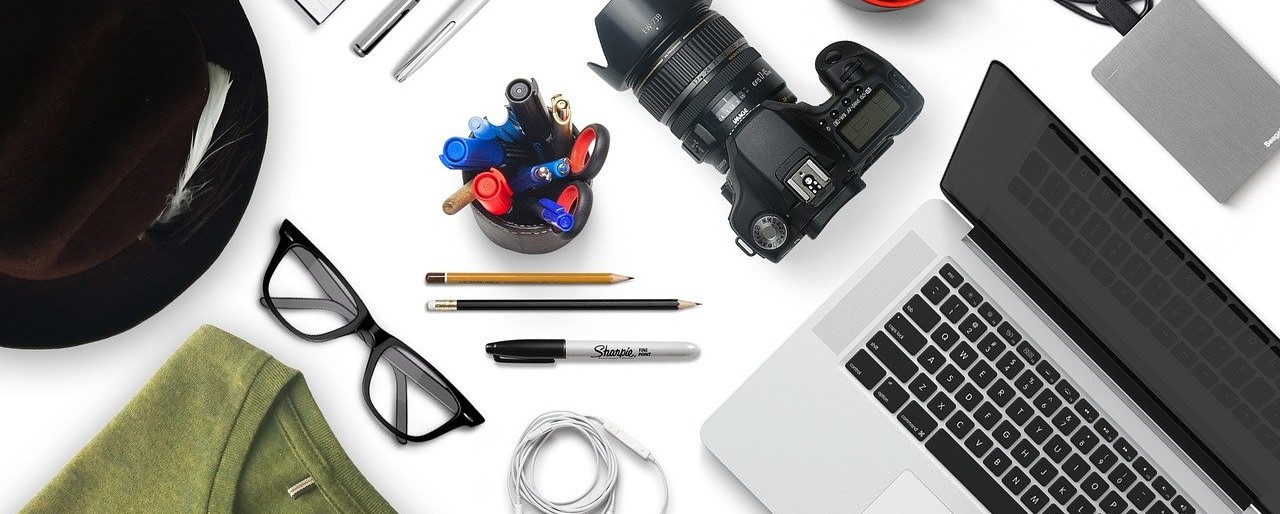
Our control room collects lost and handed-in items.
Phone: +49 721 3720 5222
If you do not find what you are looking for here, please contact the
lost property office of the city of Rheinstetten, phone: + 49 7242 9514 350.
Or to the
lost property office of the city of Karlsruhe, phone: + 49 721 133 3310.
Travelling to the NEW WORK EVOLUTION
Whether by car, local transport, train or plane - this is how you travel comfortably to the NEW WORK EVOLUTION.
You can also reach the exhibition grounds easily and in an environmentally friendly way with KVV.nextbike - the public bike and e-bike rental system of the Karlsruher Verkehrsverbund (KVV). The rental station near the exhibition grounds is located at the tram stop Messe/ Leichtsandstraße (line S2).
This is how easy it is to use the KVV.nextbike: Select the bike at www.kvv-nextbike.de or at a rental station, scan it and off you go. Please note that the number of KVV.nextbikes available is limited.
Cost of the KVV.nextbike rental bike at the basic rate:
- 1 € per 30 min (normal)
- 2 € per 30 min (e-bike)
The exhibition grounds are easily accessible via a well-developed and signposted network of cycle paths:
- Karlsruhe main station: 5.5 km
- Karlsruhe city centre: 6.3 km
- Ettlingen centre: 7 km
Further information at www.kvv-nextbike.de.
Bicycle breakdown service
With our bicycle breakdown service, we offer you a basic set of tools and aids for quickly solving a breakdown. Be it a punctured tyre, a defective inner tube, a jammed brake or simply too little air: help can be called up and equipment borrowed via the service hotline 0721 3720-5222.
Messe Karlsruhe is barrier-free and therefore handicapped accessible. All halls and entrances are at ground level, so there are no access restrictions.
Reserve a wheelchair
- Free service for your visit to the fair: Please contact the colleagues of the German Red Cross on site on the respective day of the fair under the telephone number: 0721-3720 5230.
- A wheelchair will then be brought to you for the duration of your visit. Please use the main entrance of the fair.
Parking spaces
- Parking spaces are available in the first rows in car park P1.
Trade fair shuttle
- During the event, a barrier-free trade fair shuttle will be available to you free of charge between the main railway station and the Exhibition Centre.
- Further information on how to get to the fair by local transport can be found below.
Local transport
- You can find information about the KVV travel plan for people with reduced mobility here, or by telephone from 7 a.m. to 7 p.m. on 0721/6107-5886.
German Railways
- Information on connections and Deutsche Bahn services and discounts for mobility-impaired travellers can be obtained from the following contact details:
- Telephone number: 030 65212888
- Fax number: 030 65212899
- E-mail: msz@deutschebahn.com
On the days of the fair, tickets for tariff zone 100 are valid to the Messe/Leichtsandstraße stop.
By tram
Stop Messe/Leichtsandstraße or also Messe Nord
FROM THE CITY CENTRE / DURLACHER TOR:
Line S2 (underground), direction Rheinstetten
FROM THE MAIN STATION:
- From the main station, you can take various trains to the city centre to change at the Europaplatz underground station:
- Line S1/S11 in the direction of Neureut or Hochstetten.
- Line 2 direction Knielingen Nord
- Line 3 direction Daxlanden or Rappenwörth
- At Europaplatz, take the S2 underground line in the direction of Rheinstetten (Messe/Leichtsandstraße stop).
By bus
Bus stop Messe Nord or Messe/Leichtsandstraße
FROM ETTLINGEN CHANGEFREE:
Bus line 106 (direction Neuburgweier Breslauer Str.).
All KVV bus route maps can be found here.
FROM RASTATT:
Change at the Silberstreifen stop to bus route 106 in the direction of Neuburgweier Breslauer Str.
Further information on departure times and prices can be found on the KVV website.
From the A5 / A8 motorway:
On the A8 from Stuttgart follow the A5 in the direction of "Basel", there leave the A5 at exit no. 48 "Karlsruhe-Süd" and follow the signs "Messe".
From the A65 motorway:
The A65 becomes the B10. Leave the B10 at exit no. 8 and follow the signs to "Messe".
Parking spaces
On the exhibition grounds you will find a total of 7,000 parking spaces in 2 car parks as well as a car park for VIPs/press. Parking fee: 9,00 €/day. (On site at the box office 10€) Please use P1 or P3/Peter-Gross-Bau Areal during NEW WORK EVOLUTION.
Are you travelling with a motorhome or caravan and would like to stay overnight directly at the trade fair? We offer you the opportunity to do so at our car park P3. Electricity connection can only be guaranteed if ordered in good time.
Please book your parking space using the following form up to 14 days before the start of the fair. Electricity can only be guaranteed if ordered in good time:
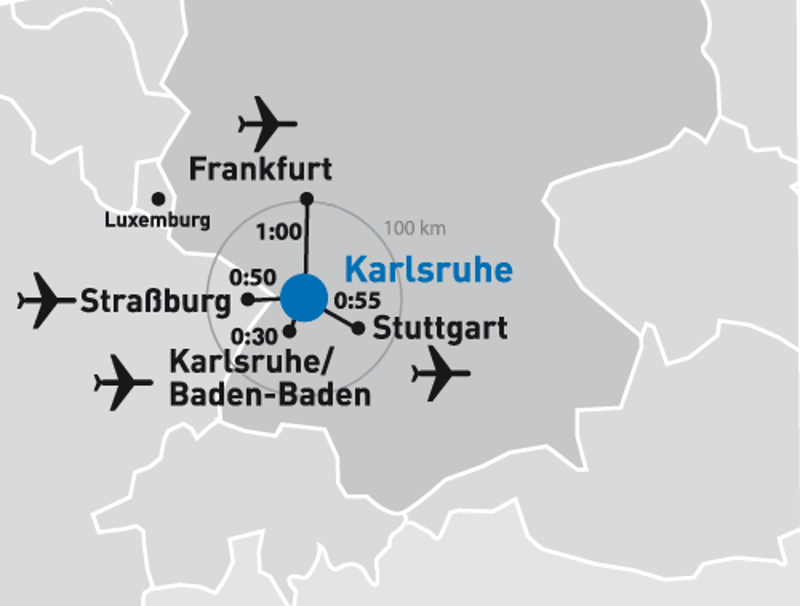
Messe Karlsruhe can be easily reached via 4 airports:
The flight to Stuttgart from metropolises such as Brussels, Milan and Vienna takes little more than 1 hour.
The excellent rail connections ensure a fast onward journey to Karlsruhe.
From Baden-Airpark you can reach the exhibition centre in just 30 minutes by car.
Via Karlsruhe/Baden-Baden airport (approx. 30 minutes by car) as well as the international airports of Frankfurt, Stuttgart and Strasbourg (50-60 minutes by car).
We recommend that you travel via Frankfurt Airport.
Your stay at the NEW WORK EVOLUTION

Karlsruhe
From the Baden residence to the centre of the TechnologyRegion - the fan-shaped city of Karlsruhe has a lot to offer.Karlsruhe, the fan-shaped city, is a historic and cultural city in the southwest of Germany and is the second largest city in the state of Baden-Württemberg. There are a multitude of sights and attractions in this city. Starting with the castle in the centre of the city, the surrounding gardens, the market square, the shopping street in the centre of the city and the various restaurants. Karlsruhe is a city full of history, art and technology. Situated between the Black Forest, the Vosges Mountains and the Palatinate Mountains on the Rhine plain, Karlsruhe with its more than 310,000 inhabitants is a cultural metropolis, technology region and science centre in equal measure.
The quality of life is high, the region is booming - a city that can be described as a "think tank with a way of life" and that impresses with its many different facets.

AfterFair
Discover delicious restaurants, Karlsruhe's nightlife or the most relaxing places in the area
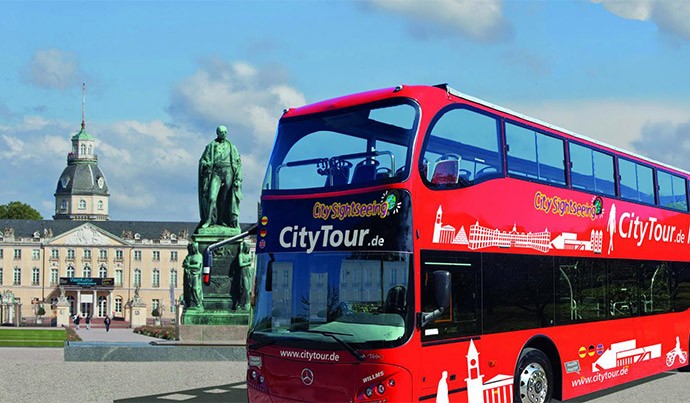
Karlsruhe CityTour
Karlsruhe CityTour with the HopOn HopOff double-decker bus!
Hop on and discover Karlsruhe's sights.
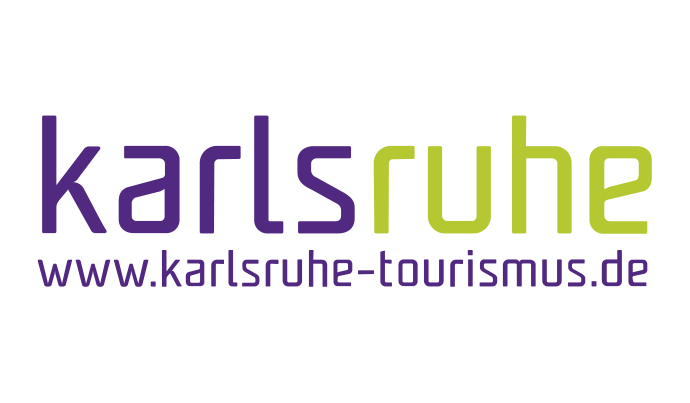
Karlsruhe | Tourism
Would you like to learn more about the Baden metropolis?
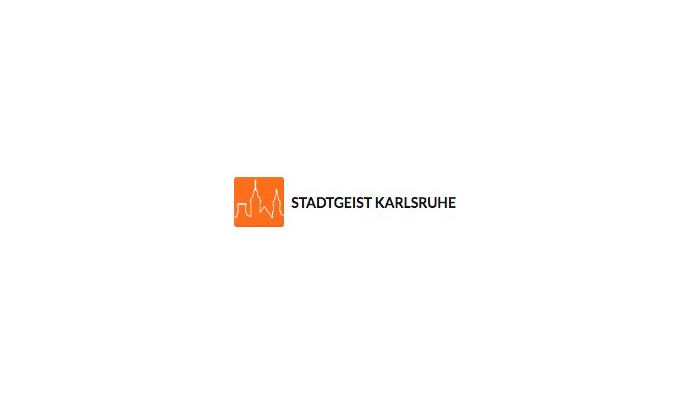
City Spirit Karlsruhe
Experience Karlsruhe from a new perspective!

